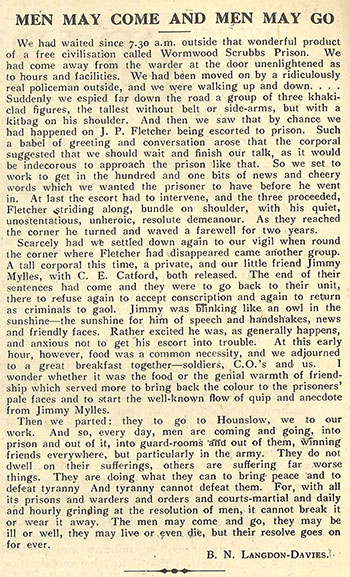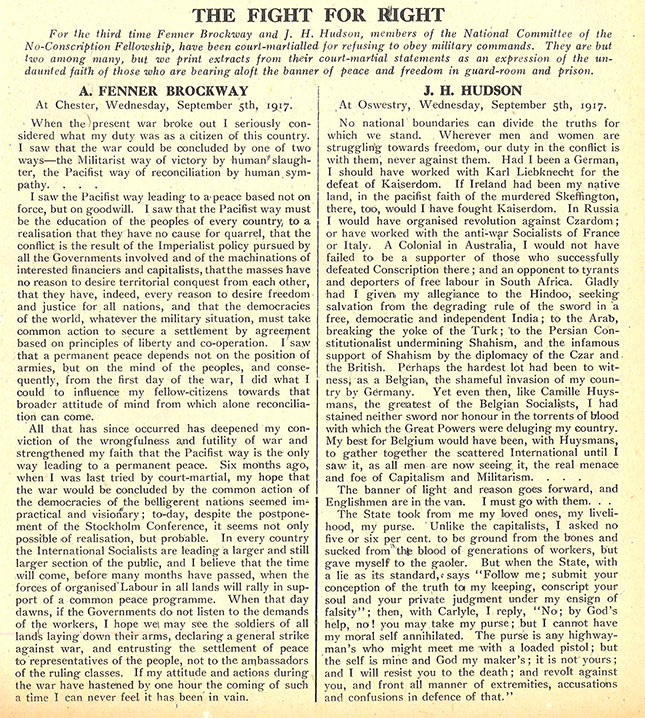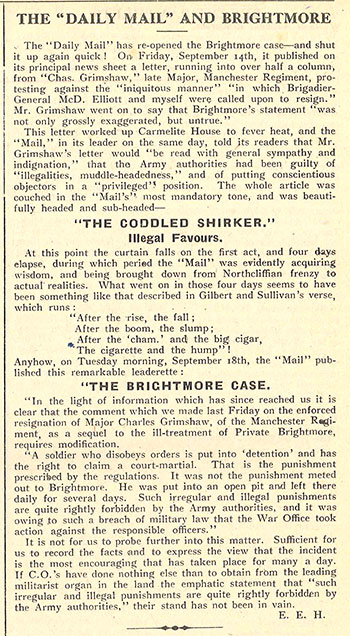
| HOME | TRIBUNAL HOME |
The September issues of the Tribunal carry on the story of Conscientious Objection at Home and Abroad much as usual, but after the drama of recent months, it’s worth taking a look at the small scale human drama that was unfolding unrelentingly in this month’s look at the Tribunal.
6th September- Men may come and men may go
As the imprisonment of Absolutist Objectors ground on towards the 18 month mark, it was an increasingly common sight for men to be entering prison on their second and even third sentences. Multiple sentences were one of the most pointless and controvertial parts of the government’s attempts to control the CO issue. Men released from a custodial sentence for disobeying orders would find themselves again liable for call up - conscripted into the army and, with the short diversion of a court martial, again sent to prison. While we can see this happening on an enormous scale from the vantage point of today, it’s worth remembering that to those involved these were momentous, but very short, incidents. Transfer from one prison to another (via release) could be as rapid as a few weeks, leaving COs to find what comfort they could with family and supporters before the punishment began anew.

“Men may come and men may go” is the account of two small moments of interaction and kindness in the lives of COs entering and leaving Wormwood Scrubs. The writer, Bernard Langdon-Davies, was too old for call up, but was an ardent supporter of the cause, and his own son, Eric, was in prison at the time. His visiting party at Wormwood Scrubs, after being turned away, happily meets J.P Fletcher on his arrival at the prison, giving him “the hundred and one bits of news and cheery words we wanted the prisoner to have” before he “turned and waved a farewell for two years.”
Jimmy Myles and Cecil Catford, both London Quakers, are met on release with “sunshine of speech and handshakes, news and friendly faces” and settle down for breakfast with the visitors and their soldier escorts.
And so, Bernard Langdon-Davies writes, “men are coming and going, into prison and out of it, into guard rooms and out of them, winning friends everywhere, but particularly in the army”. It is a pleasant little article that reminds us - just as it did the COs going to and from prison - that there was a widespread and dedicated support movement for the men who refused to kill, one that was motivated by the justice of the cause and who understood the important psychological effects of small acts of kindness. Many of them found inspiration from the men going to prison - just as I’m sure the CO’s did from their supporters. “Men may come and go” Langdon-Davies wrote “...but their resolve goes on forever”.
13th September - The Fight for Right
These small moments of kindness were complimented by moments of resolute determination - and the two together formed the cornerstone of the CO movement. The Fight for Right reprints two court martial statements from key members of the NCF National Committee, Fenner Brockway and James Hudson. Both were strongly socialist, making their third appearance before court martial. The statements show one of the rare moments when COs were given a platform to voice their views. In both cases this was seized upon, with Fenner speaking eloquently on reconciliation and peace and Hudson preaching the International against all manner of tyrannies.
What makes these excerpts so interesting is not just what they say about the varieties of the socialist position during the war, but also that while certainly written with an eye towards publication, they were statements made by men in a precarious position. Though both Fenner and Hudson had been through the court martial process twice before, military trials were not safe or sympathetic places for COs and standing to make not just an anti-war but anti-imperialist statement of this kind shows the kind of bravery COs had to have in their interactions with the military and civil government.
Both statements were made on the same day - Wednesday 5th September 1917 - and would have been made in very similar environments. The men would have been asked to speak in their defence in the same, set and formal words, stood and paused before reading their statements. A very quick moment in time - but one that produced powerful and important messages on the nature and legitimacy of war and conscription.

20th September - The Daily Mail and Brightmore
Following on from the revelations of the Brightmore case published in August’s Tribunal, the NCF must have delighted in reprinting the climbdown issued by the Daily Mail over the brutality Brightmore received. The Daily Mail had long been hostile to Conscientious Objectors, but it’s printing of a letter from Major Grimshaw (cashiered) protesting against the “grossly exaggerated... untrue” allegations of brutality against CO’s under the title “THE CODDLED SHIRKER” was a step too far. Four days later they had to return to the story to issue an apology and clarification. With the allegations against Grimshaw and Brigadier-General Elliott being proved true to the satisfaction of the House of Commons, the Mail’s support for soldiers committing acts of illegal brutality mysteriously dwindled away. The Mail being forced to print:
“Irregular and illegal punishments are quite rightly forbidden by the Army authorities”
after it’s triumphant approach to the “Coddled Shirker” must have caused at least a little glee in the NCF offices - as their barely restrained tone shows.
